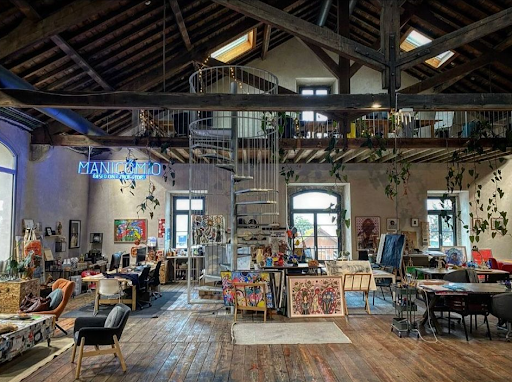- Home
- Collaborative Area
- The Manicómio
The Manicómio

The Manicómio is a prominent location in the Beato region of Lisbon, known for its innovative approach to artistic creation and dedication to mental health. This unique space houses a variety of projects that intertwine art, creativity, and social transformation, with a particular focus on contemporary artists and creatives facing mental health challenges. These individuals often experience exclusion due to the stigma associated with mental illness in society. The Manicómio originates from two decades in mental health, art, and culture. Notable artists and exceptional works within psychiatric hospitals and the art scene were identified. Sadly, stigma led to their exclusion from Portugal’s commercial art world. During its initial art exhibitions, now at Hospital Psiquiátrico de Lisboa, renowned artists, both local and global, united with hospital artists. This fusion enabled anonymous appreciation of works, breaking stigma-imposed barriers and shifting focus to art appreciation. In 2018, Manicómio embraced a fresh start in a coworking space with professionals, creatives, and companies, embodying a future where diversity, recognition, and acceptance of human experiences, including mental health nuances, are vital. With a focus on disruption, equity, and human rights, the Manicómio collaborates with the artistic community, civil society, businesses, and institutions to reshape the status quo and foster new paradigms of value.
Main activities:
- Artistic and creative centre housing Portugal’s first studio and gallery art brut and contemporary art, featuring 14 resident artists. We offer freedom, artistic representation, and agency in sales, exhibitions, and collaborations.
- A creative design and communication agency on a global scale, employing creatives with mental health conditions.
- Engaging in consulting and advocacy activities within the realms of art, mental health, human rights, and labour.
Email: info@manicomio.pt
Website: www.manicomio.pt/
Funded by the European Union. Views and opinions expressed are however those of the author(s) only and do not necessarily reflect those of the European Union or the European Education and Culture Executive Agency (EACEA). Neither the European Union nor EACEA can be held responsible for them.